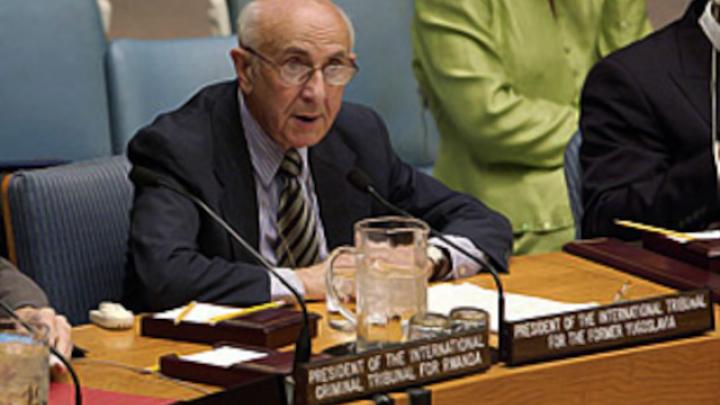Completion Strategy Report: President Meron’s Address before the Security Council

The Tribunal’s President, Judge Theodor Meron, today addressed the United Nations Security Council to provide an update on the work and achievements of the Tribunal over the past six months. In his second address to the Security Council since becoming President in November 2011, President Meron reported on steps taken in the implementation of the Tribunal’s Completion Strategy, the transition to the International Residual Mechanism for Criminal Tribunals and the positive impact of recent reforms on the pace of the Tribunal’s work. President Meron also spoke of the difficult challenges still faced by the Tribunal during the final years of its mandate, highlighting in particular the issue of staff attrition.
President Meron applauded the “exceptional efforts” of the Tribunal’s Judges and staff and the implementation of management reforms which together had ensured that “this reporting period has been one of great productivity on the part of the Tribunal, leading to substantial progress toward the completion of its mandate”.
Turning to the Tribunal’s current caseload, the President informed the Security Council that of the 8 cases currently before the Trial Chamber, 5 are expected to be completed by December 2012. The trials of Ratko Mladić and Goran Hadžić may, he explained, continue past the previously indicated completion date of December 2014. Highlighting that the Mladić and Hadžić cases had begun six and three months respectively earlier than their anticipated start dates, the President assured the Security Council that “the benches hearing those cases continue to focus on innovative ways to minimise potential delays while fully protecting the rights of the accused”.
The President indicated that “the adoption of innovative measures” by the Appeals Chamber had led to the hearing in the case of Ante Gotovina and Mladen Markač being held nine months earlier than previously forecast. President Meron also highlighted the rapid preparations taking place in the appeal of Momčilo Perišić.
Drawing the Security Council’s attention to the possibility that potential appeals in cases of Zdravko Tolimir, Jadranko Prlić et al. and Vojislav Šešelj would fall within the jurisdiction of the Residual Mechanism, due to unforeseen delays in the trials themselves, the President assured the Security Council that he was taking “all possible measures consistent with principles of due process and judicial independence to ensure the completion of these cases (….) as soon as possible”. This includes the continuation of measures previously adopted by President Meron to reduce the translation times in these cases by 50%.
Highlighting staff attrition as one of the principal challenges facing the Tribunal, the President informed the Security Council that delays in several ongoing cases could be directly attributed to this issue. Whilst expressing gratitude to the UN Office of Human Resource Management for issuing a waiver on the prohibition of the direct hire of interns, the President stated that this measure is not a panacea and that highly experienced and valued staff continue to leave the Tribunal. President Meron emphasized the importance of ensuring that staff departures “do not place too onerous a burden on the remaining staff, whose extraordinary commitment, diligence, and talents are fundamental to the Tribunal’s continuing success”.
Regarding the establishment of information centres in the region of the former Yugoslavia, the President informed the Security Council of the commitment of the Croatian Government to the establishment of such a centre, and that expressions of support for a centre in Sarajevo had been received from the Bosniak and Croat members of the Presidency of Bosnia and Herzegovina. The President indicated that the Tribunal is still awaiting advice from the Government of Serbia on the establishment of information centres on its territory.
Updating the Security Council on progress in preparing for the transition to the Residual Mechanism, the President noted that the Residual Mechanism will commence operations with the opening of the Arusha branch of the Mechanism. A number of steps have been taken in anticipation of this milestone, including the swearing in of all Judges, the circulation of draft Rules of Procedure and Evidence to the Judges for their consideration, and the advertising of vacancies in order to recruit necessary staff. The principals of the Residual Mechanism and the ICTR have also taken a number of vital decisions related to the orderly transfer of ICTR functions to the Mechanism.
President Meron praised the “stellar work of all those involved in facilitating a seamless transition to and smooth commencement of the Mechanism”. Thanks to these preparations, on 1 July 2012, the Mechanism will be ready to assume competence over all relevant judicial and prosecutorial functions in relation to the ICTR including the protection of victims and witnesses, the tracking of fugitives, and the enforcement of sentences.
In closing, President Meron observed that, by establishing the Residual Mechanism, the Security Council has helped to guarantee that “the closure of the two pioneering ad hoc tribunals does not open the way for impunity to reign once more”. With the Residual Mechanism, the Security Council has also helped to ensure that the rights of victims, witnesses, persons whose cases have been referred to national jurisdictions, and persons tried or convicted by the Tribunal and the ICTR will remain both respected and protected. President Meron stressed that the establishment of the Residual Mechanism “is crucial to safeguarding the Tribunal’s own invaluable legacy” and thanked the Security Council for ensuring that “the very best traditions of international criminal justice – which the Tribunal has helped to define for nearly two decades - live on”.